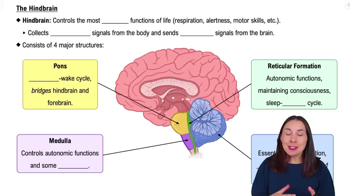Table of contents
- 1. Introduction to Psychology1h 43m
- 2. Psychology Research2h 20m
- 3. Biological Psychology2h 41m
- 4. Sensation and Perception28m
- 5. Consciousness and Sleep32m
- 6. Learning41m
- 7. Memory34m
- 8. Cognition37m
- 9. Emotion and Motivation35m
- 10. Developmental Psychology33m
- 11. Personality48m
- 12. Social Psychology41m
- 13. Stress and Health41m
- 14. Psychological Disorders44m
- 15. Treatment47m
3. Biological Psychology
The Hindbrain
Struggling with Psychology?
Join thousands of students who trust us to help them ace their exams!Watch the first videoMultiple Choice
Karu is two months old and cannot yet sit upright on his own. Karu's inability to sit on his own is most likely due to which of the following?
A
Karu suffers from an enlarged medulla.
B
Karu's cerebellum has not yet fully developed.
C
Karu has a lesion in his midbrain.
D
Karu's reticular formation failed to form properly during prenatal development.
 Verified step by step guidance
Verified step by step guidance1
Understand the developmental milestones of infants: At two months old, infants typically cannot sit upright on their own. This is a normal part of development as certain brain structures and motor skills are still maturing.
Identify the brain structure involved in motor control: The cerebellum is a part of the brain that plays a crucial role in motor control and coordination. It is responsible for helping with balance and posture, which are necessary for sitting upright.
Consider the development of the cerebellum: In infants, the cerebellum is not fully developed at birth. It continues to mature over the first few years of life, which is why young infants like Karu cannot sit upright independently.
Evaluate the other options: An enlarged medulla, a lesion in the midbrain, or issues with the reticular formation could cause other developmental issues, but they are not typically associated with the inability to sit upright at two months.
Conclude with the most likely explanation: Given the normal developmental timeline and the role of the cerebellum, Karu's inability to sit upright is most likely due to the cerebellum not being fully developed yet, which is typical for his age.

 5:18m
5:18mWatch next
Master The Hindbrain with a bite sized video explanation from Hannah Gordils
Start learningRelated Videos
Related Practice




![[Psychology] The Nervous System #04: The Hindbrain, Its Structures And Its Functions](https://img.youtube.com/vi/x2g-HpxLtDw/mqdefault.jpg)




